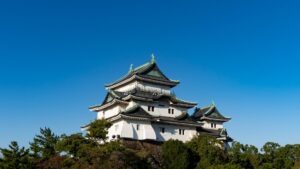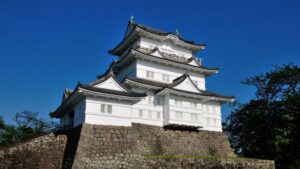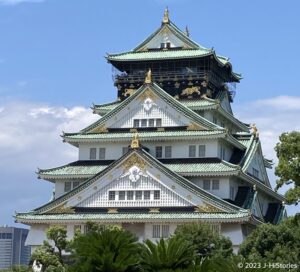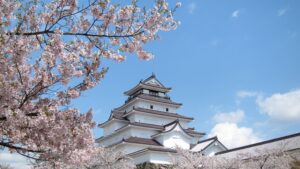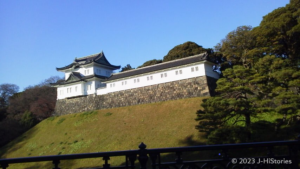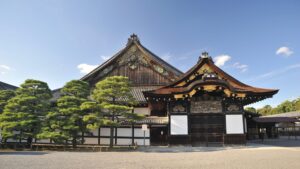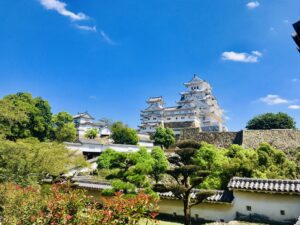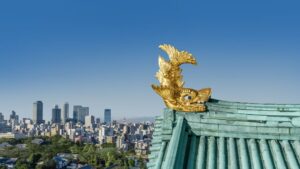Wakayama Castle, A Great Lord, Yorinobu, laid the foundation of the Kishu's prosperity
In 1619, three years after Tokugawa Ieyasu's passing, his 10th son, Tokugawa Yorinobu (1602-1671, 徳川頼宣), received 555,000 koku, equivalent to the rice crop of yield (*) and established the Kishu domain (present-day Wakayama and southern Mie Prefectures). Wakayama Castle, the Kishu Tokugawa Family's residence, was extended and constructed at the mouth of the Kino River, […]
Odawara Castle: Hojo Clan's Independence from shogunate and People-Centered Policy
A remarkable Hojo clan, a pioneering and the final force of Sengoku Daimyo, a territorial lord in the Warring States Period (1467-1573), who reigned supreme in the Kanto region for a century-spanning five generations. Their unwavering ambition was to be independent of the vested interest of the Muromachi shogunate (1336-1573) and to safeguard the livelihoods […]
The Standing Original Castle, the History of Inuyama Castle
Inuyama Castle, a national treasure, stands on a small mountain overlooking the Kiso River, dating back to 1537. It holds among Japan's five castles designated a national treasure, including Himeji, Matsumoto, Hikone, Inuyama, and Matsue. The castle was constructed during the tumultuous Warring States period, and a dizzying array of castle owners changed due to […]
Osaka Castle History: An unsurpassed Samurai Hideyoshi’s ambition to become a ruler of Japan
Osaka Castle was built by Toyotomi Hideyoshi. Along with the castle, its castle town, known as a "Water City," was also constructed. Unfortunately, the castle was burnt down during the Siege of Osaka in 1615 after Hideyoshi's death. Despite the destruction, the castle town demonstrated its logistical capabilities and played an important role as an […]
Tsurugajo Castle in Aizu, A symbol of samurai loyalty during the Meiji restoration
Bells rang in the center of the castle town of the Aizu domain, signaling the invasion of Meiji government forces. Despite the Aizu domain's allegiance to the Tokugawa shogunate and generations of shoguns, the castle fell under incessant bombardment. This is in contrast to the shogun's residence, Edo Castle, which surrendered without bloodshed. Why did […]
Tokyo Imperial Palace: Edo Castle Ruins and the Bloodless End of the Samurai Era
Explore Tokyo’s Imperial Palace: Edo Castle Ruins and the Legacy of the Samurai Era
Nijo-jo Castle Watched the Rise and Fall of Tokugawa shogunate
Nijo-jo Castle - a UNESCO World Heritage and National Treasure site - is a residence of successive Tokugawa shoguns in Kyoto. This stunning castle had witnessed the growth, development, fall, and eventual end of the Tokugawa shogunate. What was the final stage of the Tokugawa shogunate that Nijo-jo Castle saw? How did the last shogun, […]
Himeji Castle: Overwhelming Beauty and Impregnable Defense
Himeji Castle, a UNESCO World Heritage Site and National Treasure, is renowned for its stunning architecture, often likened to a White Heron in flight. Built by Tokugawa Ieyasu, its beauty also served as a symbol to deter Toyotomi-loyal warlords.
Azuchi Castle, the first picturesque light-up event in Japan
The most powerful warlord, Oda Nobunaga (1534-1582, 織田信長), had a great zeal to realize a peaceful nation through his clever strategies, rationalism, and immense military power to end the Warring States Period. After seeing people’s joyful faces at the light-up event, he likely felt a deep sense of emotion and elation, realizing his lifelong ambitions […]
Why was Nagoya Castle Built? For the Iron Defense of the Tokugawa shogunate
Nagoya Castle was built by a warlord, Tokugawa Ieyasu, as a solid fortress in 1612, just two years before the Winter Siege of Osaka against the Toyotomi clan. After Ieyasu's victory, Nagoya Castle kept the western lords in check in the middle of the Tokaido road connecting Edo (Tokyo) and Osaka. He was eager to […]

